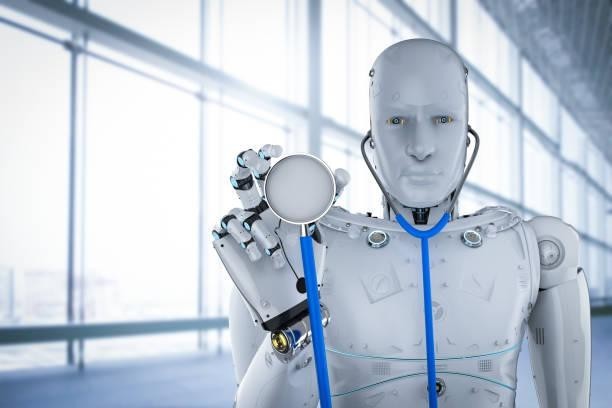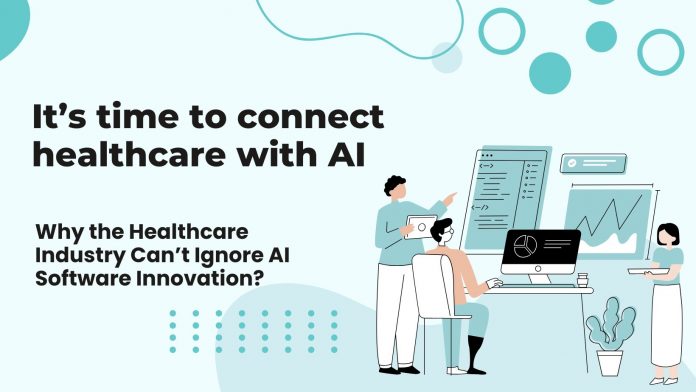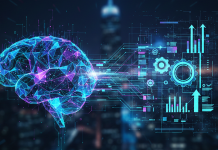In recent days, you have likely heard the words “AI,” “artificial intelligence in healthcare,” “AI Software Innovation,” chat GPT, and Deepseek. Additionally, statements like “healthcare providers are utilizing AI to diagnose diseases and cure treatment” have been made.
It’s certainly true that the healthcare industry is changing its gear regarding the way treatments are done, the way how patients are consulted using telemedicine solutions, and the way diseases are diagnosed before they occur.
Now, you might be wondering what’s all this about. Why should we, as healthcare providers, use AI? Is it safe to use? Will it be helpful to us? Why is everyone racing behind AI, and is it really the only future?
Well, there are endless use cases and predictions about the future of healthcare and the profound impacts of AI on healthcare services. As a result, in this blog, we are going to guide you on how to utilize AI in your healthcare business.
To stay ahead and secure your spot in the marketplace, the adoption of AI is essential for your healthcare business to reshape patient care and operational efficiency in ways that traditional methods simply can’t match.
Now, there are two perspectives regarding AI that people are talking about currently, especially when it comes to the healthcare industry.
- One where healthcare providers should continue without AI adoption
- One where they embrace the transformative power of
Which one you should choose, as a healthcare provider, going forward there will be these two options from which you need to pick one, or else, it will become risky for you to survive on the market.
Let us help you here, to make an informed decision, in this blog we are going to guide you through both options with their possible futures. So without further ado, let’s get started…
One Where Healthcare Providers Continue Without AI Adoption
1. Outdated & Inefficient Processes:

Assuming you choose not to adopt AI, what impact will it have on your daily operational and administrative work?
Well, there are many daily administrative tasks from appointment booking to managing all the paperwork manual which involves patients’ records and managing their next schedule, the current task of healthcare staff becomes overwhelming and burn-out for healthcare providers.
In an industry where every second counts, you will end up doing manual things which increases the time and cost for giving patient care. Additionally, loss for your business increases as the same treatment is happening with lower prices and costs at your competitor’s place.
2. Delayed Diagnoses & Treatment Plans:
Healthcare professionals without AI are solely dependent on human expertise and standard diagnostic tools. While these methods have been
reliable for years, they come with limitations—misdiagnoses, delayed test results, and a slower decision-making process.
AI-powered diagnostics can analyze vast datasets in seconds, identifying diseases earlier and with greater accuracy. Without AI, patients may continue to face late diagnoses, leading to more severe health complications and limited treatment options.
3. Lack of Personalization in Patient Care:
Imagine as a healthcare provider you need to study patient records to analyze their disease symptoms and health history to give personalized patient care. How much time will it take for you to analyze and provide your patient with a personal care solution?
As every patient is unique, their lifestyle is different, and their genetics will be different, without AI healthcare it will be difficult for healthcare professionals to give personalized care to their patients.
4. Increased Operational Costs:
So far you probably got an idea that without the use of AI, your operational and administrative work is going to be increased. As a result, to manage your operational work and administrative tasks you need to hire more healthcare staff which increases your cost for providing care per patient.
Imagine, you need two medical staff for manage your administrative tasks and other additional staff to give patient treatment, so eventually, the number of patients/number of medical staff ratio will increase leading to an increase in healthcare service price in case you decide to charge more with patients, and if you bare yourself as a company, you end up paying more operational cost. Both ways are going down-side to nowhere track.
5.Rising Healthcare Demands & Workforce Shortages:
The healthcare staffing industry has been facing a significant amount of pushback for the last 4 years due to the rise in demands for skilled healthcare staff, facilities are struggling to get temps on per-diem and long-term shifts.
Many outdated healthcare staffing platforms fail to get the temps for shifts. As per the report, the registered nurse turnover rate is recorded at 18.4%, a 4.1% increase in shortage in one year.
This means the number of shifts scheduled and the number of shifts getting void have increased in the past couple of years due to inadequate staffing software without AI as many healthcare providers are still using old methods to schedule shifts which consumes more time to get shifts booked and facilities end up with no temps available for work.
One Where They Embrace the Transformative Power of AI

Now, let’s imagine a future where healthcare providers utilize AI to embrace the true potential of an Augmented world, where efficiency meets precisions and where innovation takes you to the next level of the healthcare era.
AI isn’t going to replace healthcare providers, it is going to foster growth, empower you, and make your job easier and more efficient with a more patient-centric approach.
In today’s landscape, new use cases are emerging, like AI medical scribe in healthcare, which allows healthcare professionals to record and generate SOAP notes from their conversations. However, this one is just a piece of the iceberg but there is more than that which AI can do..
Let me show you some glimpses of the current and possible future of healthcare with AI
1. Faster & More Accurate Diagnoses:
Today, AI algorithms are capable of analyzing X-rays, CT scans, and MRIs with high accuracy, identifying diseases and potential symptoms much faster than the human.
As a result, AI-driven diagnostics allows healthcare providers to reduce the overwhelming work of analyzing the medical data manually which takes time. Additionally, AI works as a second pair of eyes that reduces error and provides earlier detection, which leads to improved treatment outcomes.
2. Personalized & Precision Medicine:
AI is the key to personalized care, why? Imagine you have one expert who has been trained to help you study, analyze the patient’s data, and provide personalized care to AI-Powered Patient Care with better treatment plans.
Predictive Analytics in Medicine takes this even further, allowing healthcare providers to anticipate health risks before they become serious issues. Imagine getting a warning sign for potential heart disease based on AI-driven insights—giving you a chance to take preventive action before it’s too late.
As a result, AI is not just limited to personalized care, it’s far beyond just that with predictive analytics.
3. Automation of Administrative Tasks:
One of the most practical impacts of AI is in the administrative task. Today, an average medical staffer does all of his job manually from calling patients to scheduling appointments, and most of the time it becomes overwhelming and burnout for them.
Instead AI-powered software like healthcare staffing app solutions, telemedicine app solutions, EHR software, and patient management
software, can help you automate and streamline your tasks like Auto-scheduling shifts for temp and auto-schedule appointments for your patients.
Indeed, it requires you to validate and maintain your task completed by AI, and here is where the people who know AI can not be replaceable.
4. Better Resource Management & Cost Reduction:
As per the data, healthcare facilities end up spending more than $113 million on expenses in salary every year which increases their losses in business.
As a result, your 75% of administrative tasks can be automated with the help of an AI-powered solution. This results in fewer resources to hire, as most of your tasks are going to be managed by AI, and with less number of staff you will end up saving additional cost and time to operational work.
This reduces unnecessary hospitalizations, cuts operational costs, and ensures that resources are used where they are needed the most. In an industry where every second and every dollar matters, AI helps healthcare providers stay ahead.
5. Telemedicine & AI-Powered Virtual Healthcare:
AI has revolutionized telemedicine, making healthcare more accessible than ever before. AI chatbots and virtual assistants can triage patients, provide initial consultations, and answer medical queries instantly—reducing the strain on healthcare professionals. Telemedicine, powered by AI, bridges the gap between patients and doctors, especially for those in remote or underserved areas. Now, patients can get professional medical advice without leaving their homes, ensuring faster and more convenient healthcare access.
Wrapping-up
Choosing not to adopt AI isn’t just about missing out on technology—it’s about compromising efficiency, accuracy, and, most importantly, patient outcomes. The future of healthcare is already unfolding, and the question is no longer whether AI will be a part of it, but whether providers are ready to embrace the change or risk being left behind.
As the industry evolves, integrating healthcare software development powered by AI can bridge the gap between traditional practices and modern efficiency. Whether it’s automating workflows, enhancing diagnostics, or personalizing treatments, tailored AI-driven solutions allow healthcare providers to optimize care while maintaining a human-centered approach.






